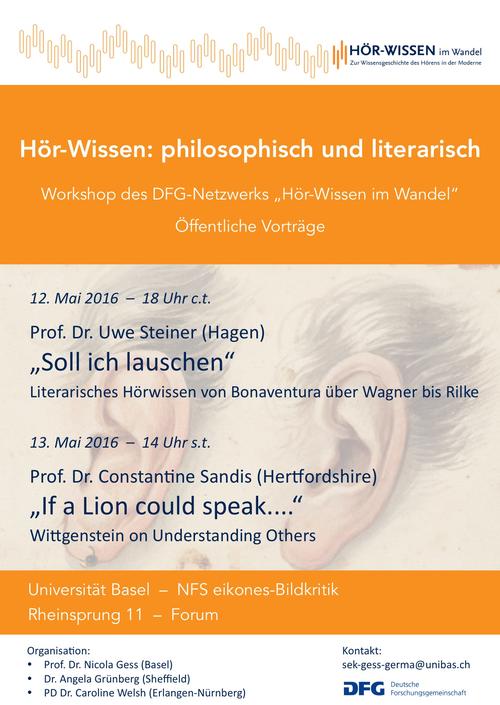VI. Auditory Knowledge in Philosophy and Literature: Sound and Language
Basel, May 12-13, 2016
The workshop's focus on "sound and language" brought together historically and culturally divergent ideas about the musical elements of language as well as about the semanticization of sounds: both with regard to the effects of acoustic material on the listener (on his/her cognitive abilities as well as emotions) and with regard to the interplay of the pre/para-semantic and semantic elements of language and sound. The workshop focused in particular on literary and philosophical texts between the early modern and modern periods, as well as contemporary philosophical texts that reflect explicitly on the meaning of sound (in voice, music, and noise) and/or stage its meaning at the level of form. The basic hypothesis was that ideas about sound—both about that which is expressed in sound and that which is released in the listener through sound(s)—are informed by contemporary knowledge about physical processes of hearing/listening and its respective anthropological basis. Particular emphasis was placed on the historical transformation of attitudes about hearing/listening, from total devaluation to extreme valuation.
A second focus of the workshop addressed the medial dimension—in the case of literary, philosophical, and aesthetic texts, this refers to the textual construction of historical data about hearing/listening. Reflections about hearing/listening in the medium of language thus always refer to the (threatening or utopian) other of text, as it appears in oral speech, in singing, or in instrumental music. A precise interpretation and cultural-historical contextualization of such reflections will allow for a critical perspective on the popular ideology that asserts that the auditory dimension communicates more "unmediated" or "authentic" experiences. Seen from this perspective, this ideology may be revealed to be a linguistic construction of the utopia of preverbal communication.
Two public lectures have been held in the course of the workshop: On Thursday, 12th May, 6.15 pm, Uwe Steiner (Hagen) gave a talk entitled "'Soll ich lauschen'. Literarisches Hörwissen von Bonaventura über Wagner bis Rilke", and on Friday, 13th May, 2 pm, Constantine Sandis (Hertfordshire) held a lecture entitled "'If a Lion could speak....' Wittgenstein on Understanding Others". Both lectures have been held in the forum of the NFS eikones-Bildkritik building, Rheinsprung 11. In addition to Uwe Steiner and Constantine Sandis Britta Herrmann (Münster) has been guest to the internal workshop.
Organizers: Nicola Gess, Angela Grünberg, Caroline Welsh
Images of the sixth workshop can be found here.

